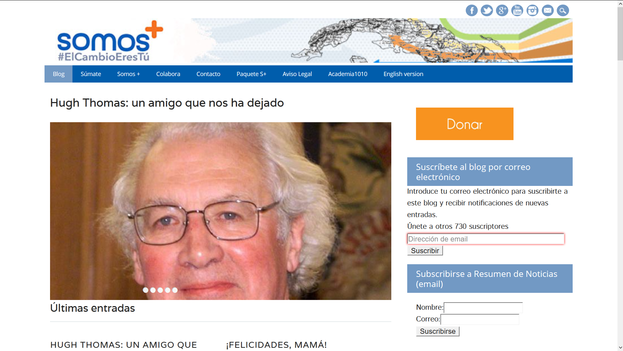
![]() 14ymedio, Havana, 16 May 2017 — The digital site of the Somos+ (We Are More) Movement has now joined the list of pages censored on the servers of the Cuban Telecommunications Company (ETECSA) which supply public WiFi. The leader of the organization, Eliecer Avila, links this measure to “the growing influence” of the site among the younger generation.
14ymedio, Havana, 16 May 2017 — The digital site of the Somos+ (We Are More) Movement has now joined the list of pages censored on the servers of the Cuban Telecommunications Company (ETECSA) which supply public WiFi. The leader of the organization, Eliecer Avila, links this measure to “the growing influence” of the site among the younger generation.
The government is “very aware of the statistics of who reads our blog and from where they are reading it,” says the opponent. “They have simply detected that the site is a threat to the system’s monolithic discourse,” he told 14ymedio on Tuesday.
“The blocking is the clearest sign our site is effective,” he adds. “We are trying to make a video tutorial of how it can be accessed despite censorship” and for months “we have had a weekly newsletter that is sent by email.”
The independent movement has been subjected in the last months to strong repression that includes the arrests of its members, police operations around the homes where they meet and a raid on Avila’s house, who is being prosecuted for an alleged crime of “illicit economic activity.”
The independent movement has been subject in recent months to strong repression that include the arrests of its members,operations around the homes where they meet and a raid on Avila’s house
Officialdom maintains censorship over several dozen critical pages, as well as blogs and opinion sites that shed light on Cuba’s most serious social problems. Among the sites shuttered in this way are 14ymedio and the news portals CubaNet, Diario de Cuba and Martí Noticias, among others.
Until the middle of last year the popular classified ad site Revolico.com also was blocked on the national servers, but in August access to that page was restored.
Cuban authorities have copied the Chinese model of filtering digital sites by their content. A situation that Internet users are struggling to overcome through the use of anonymous proxies, the so-called “virtual private networks” (VPNs), and other tools such as the Android operating system app Psiphon and the Tor browser.
Freedom House recently produced a report in which it identified 66 countries in which it believes that the free right to information is not exercised. Cuba ranked among the top ten, in a list headed by North Korea and Turkmenistan.
In September 2016, 14ymedio published an investigation into censorship of words and phrases in text messaging in the cell phone network. The state monopoly of telecommunications maintains at least fifty blocked terms, among which the name of the organization Somos+ stands out.
